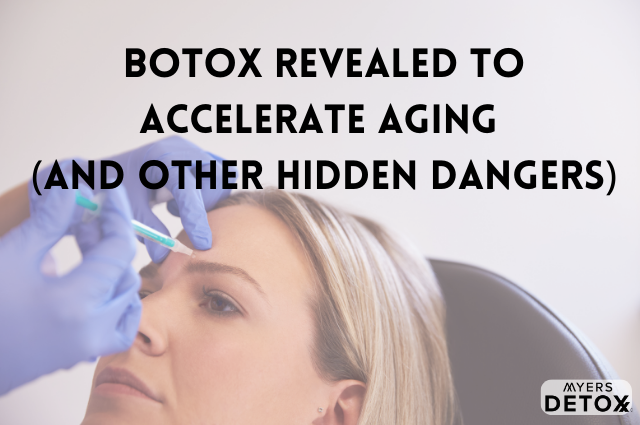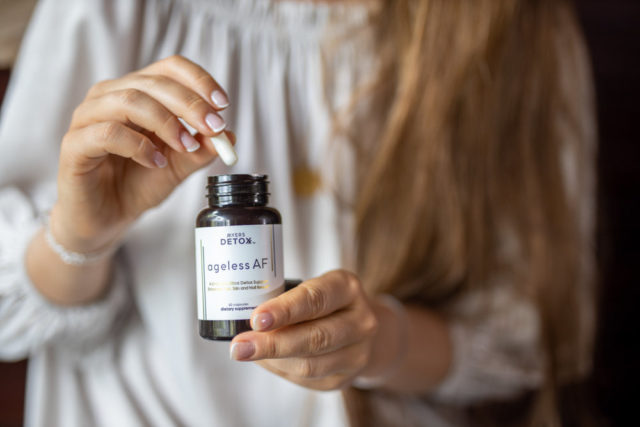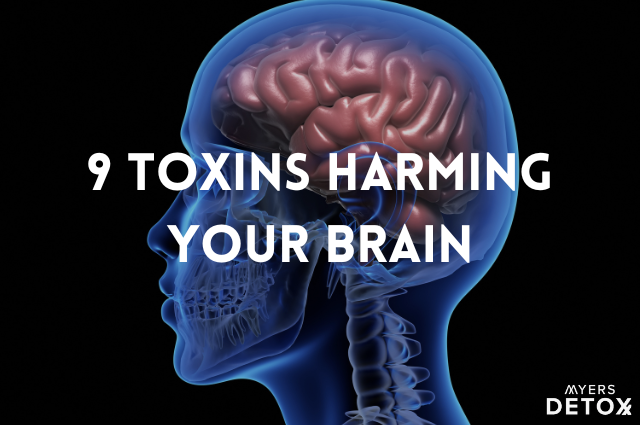Have you or someone you know received Botox in the past month? If you’re living in the United States, the answer is probably yes. And while initially Botox treatments were reserved for wealthy people over the age of 40, today people as young as 20 are getting injections.
The popularity of Botox can’t be denied. Everyone from celebrities to influencers to your next-door neighbor is hopping on board with these miracle age-defying injections. In fact, as of 2017, about 3.2 billion U.S. dollars worth of Botox was sold globally. And that number is estimated to hit 4.6 billion by the year 2024[1].
What you likely haven’t heard, however, is the very serious side effects of Botox and the public outrage that has been silenced and swept under the rug.
For example, in 2008, Public Citizen filed a petition to the FDA representing 100,000 consumers titled “Petition Requesting Regulatory Action Concerning the Spread of Botulinum Toxin (Botox, Myobloc) to Other Parts of the Body.” The petition asked the FDA to require manufacturers of Botulinum (Allergan and Solstice Neurosciences) to warn prescribing physicians of the dangers of botulinum toxin. While the manufacturers agreed to post a black box warning on their products, sales have only continued to climb[2].
Sadly, millions of people are receiving Botox injections without truly understanding the dangers of these treatments.
In this article, we’ll discuss:
- What Botox is and how it works
- The not-so-hidden dangers of Botox injections
- How Botox may accelerate aging
- The emotional consequences of paralyzing your face
- The best alternatives for improving signs of aging
What Is Botox And How Does It Work?

Botox is another term for botulinum toxins, which are proteins produced by the bacteria Clostridium botulinum. This is the same toxin that causes a type of food poisoning called botulism[3].
Of course, there are specific purification standards that drug manufacturers have to meet in order to incorporate these proteins into their products – but that doesn’t change the fact that this drug is sourced from a known toxin.
Why is Botox so good at smoothing out wrinkles?
Once these proteins, which are known neurotoxins, get into your skin (and other tissues), they block nerve transmissions to your muscles. This causes your muscles to relax, reducing the appearance of wrinkles. What people often overlook, however, is that since this muscle relaxation is caused by a neurotoxin, it can also lead to loss of muscle control and paralysis[4].
The Physiological Dangers of Botox
While the assumption is that Botox strictly impacts the site of injection (most commonly the face), the real danger with this substance is that it’s able to travel beyond the injection site, infecting other parts of your body.
Most concerning, perhaps, is Botox’s impact on your nervous system. First, it should be noted that Botulinum is known as one of the deadliest neurotoxins. And yes, we are injecting it right into people’s heads.
Research shows that contrary to the popular opinion that Botox is completely safe, following a botox injection, Botulinum may be transported via your nerves back to your central nervous system. This means that we are injecting a highly potent neurotoxin just centimeters from our brain[5][6].
But your nervous system isn’t the only thing you need to worry about when injecting Botox. Since this toxin can travel from the injection site, it may produce paralyzation and loss of muscle control throughout your body in different tissues.
Interestingly, if you want to find out the real dangers behind Botox, you don’t have to look much further than the manufacturer’s website:
Health Warnings On The Botox® Website
For a detailed readout of the health implications of Botox, you can visit the website here.
But I’ll just share some of the highlights:
- Problems swallowing, speaking, or breathing (may be life-threatening)
- Bronchitis and upper respiratory tract infections
- Change or loss of voice
- Trouble speaking
- Loss of bladder control
- Overall muscle weakness
- Bleeding behind the eye
- Itching
- Rash
- Welts
- Wheezing/asthma
- Dizziness
- Dry mouth
- Headache
- Double vision
- Vision loss
- Drooping eyelids
While some of these symptoms are due directly to the outcomes at the injection site, the manufacturer notes that others are due to the spread of toxic effects throughout the body.
Other Potential Dangers
In addition to the dangers listed on the Botox website, studies show that the following are also associated with Botox injections[7][8][9][10][11][12][13][14]:
- Severe velopharyngeal insufficiency (this occurs when the sphincter between your oral and nasal cavities doesn’t close completely)
- Brachial plexopathy (a form of peripheral neuropathy)
- Necrotizing fasciitis (aggressive skin and soft tissue infection that causes necrosis of the muscle fascia and subcutaneous tissues)
- Crisis of myasthenia (a medical emergency that occurs when the muscles that control breathing weaken to the point where a ventilator is required to breathe)
- Generalized paralysis
- Impairment of speech and chewing
- Guillain-Barré syndrome (a rare condition in which a person’s immune system attacks the peripheral nerves)
- Severe dysphagia (difficulty swallowing)
- Aspiration pneumonia
- Unilateral facial madarosis and alopecia (loss of eyebrows and eyelashes)
- Palatal palsy (loss of motion of the muscle in the soft palate so that the roof of the mouth does not properly elevate)
Can Botox Accelerate Aging?
Now, here’s the thing that no one trying to sell you Botox will tell you: although the short-term effect of Botox may appear anti-aging, the long-term effects may, in fact, accelerate the aging process.
How?
A study on Drosophila flies found that even small doses of botulinum toxin can instigate accelerated aging by increasing oxidative stress and DNA damage and upregulating several markers for cellular aging[15].
This, in turn, can directly impact the health of your skin as oxidative stress and inflammation can cause damage to the extracellular matrix (ECM) of your skin (the layer that acts as a scaffolding to hold skin tight and firm) and stimulate skin aging through intrinsic pathways[16].
Put simply, injecting this toxin into your skin may improve the look and feel of your skin in the short term, but when the initial effect wears off, your skin will likely be in worse shape than when you started.
This is why so many people get addicted to Botox – it’s a constant chase for the illusive fountain of youth that actually pushes you farther away from looking and feeling your best.
Emotional Dangers of Botox
Studies show that Botox injections can change how your brain responds to emotional stimuli.
How exactly?
When you feel an emotion, it shows up on your face – that’s how people can communicate with one another without speaking. For instance, when your best friend is worried, you can likely tell just by their facial expression. Well, research shows that the connection between facial expression and emotional state is a two-way street, meaning that your brain picks up on what the muscles in your face are doing.
Try it right now, regardless of what you’re feeling, and put a big smile on your face. Do you feel a little lighter? That’s because your brain is getting the signal that you’re happy. Pretty amazing.
Now, here’s the problem with botox: research shows that due to the paralysis of facial muscles, certain areas of the brain cannot pick up on emotional cues. In one study, Botox treatment reduced activity in the amygdala and impaired its coupling with the brain stem, which is responsible for the production of autonomic emotional states[17].
In another study, researchers found that Botox injections directly weakened participants’ amygdala activity in the presence of angry faces[18].
Now, that’s just the impact that Botox can have on your own emotional processing, but things get even dicier when we examine the impact it can have on your ability to understand other people’s emotions.
Have you ever noticed that when a loved one is hurting, you can’t help but frown? As humans, we automatically mimic the facial expressions of the people we’re communicating with as a way of deepening our understanding and empathy. Research shows, however, that Botox injections can dampen emotional perception and, therefore, weaken our ability to feel empathy for another[19].
Studies also show that Botox may interfere with our ability to pick up on subtle facial expressions from the people around us. This could create a significant issue as most people subconsciously assess their company by their subtle facial expressions and body language. Without the ability to pick up on delicate cues, life can become incredibly isolating[20].
Spiritual Dangers of Botox
One of the most common injection sites for Botox is the procerus muscle, which sits right between your eyebrows. This is the muscle that’s responsible for the frown lines that show up when you’re squinting due to bright lights or furrowing your brow due to emotional expression[21].
While this may seem like an optimal place for Botox due to the natural creases that show up between your eyebrows, this specific area of your body is also the precise location of your third eye, or in Chinese medicine, the Yin Tang.
Ancient cultures have revered this center in your body as the home of intuition and your connection to the divine. While we can’t scientifically prove that Botox will impact our spiritual connection, it stands to reason that paralyzing this area of your body could impede efforts in connecting to higher levels of consciousness.
Alternatives To Botox

One alternative to Botox is an injectable called Xeomin. While Xeomin is also made with botulinum toxin, it doesn’t contain any other additives, which reduces the overall risk of allergic reactions.
That said, Xeomin is still a toxin and should be used with caution.
The good news is that if you’re looking for more natural alternatives, there are plenty of nutrients that can offer anti-aging benefits that not only improve the look and feel of skin, but can actually slow down skin aging intrinsically.
Four of my top nutrients for skin anti-aging include hyaluronic acid, biotin, silica, and selenium.
Hyaluronic Acid
One of the common signs of aging is dry, sagging skin that’s lost its luster. When your skin is able to trap moisture, it can bring nourishment to your skin cells and perk them up, displaying a healthier, more youthful complexion (with fewer fine lines and wrinkles).
Hyaluronic acid (HA) is the number one nutrient that supports skin hydration. Unfortunately, as you age and are hit with toxic insults from your environment, HA levels naturally begin to decline. That’s why supplementing with HA is one of the most crucial things you can do to keep your skin healthy from the inside out[22].
Biotin
Biotin is a B vitamin that acts as an essential coenzyme for a number of compounds involved in the synthesis of fatty acids, which are crucial components of the outer layer (or membrane) of your cells. The health of your skin cells depends heavily on the fatty acid composition of their cellular membrane, as it’s the membrane that ushers in nutrients while shuttling out toxins[23].
Due to its biological activity, biotin is well-known for its ability to promote the health of your hair, skin, and nails, often being recommended to strengthen and assist in growth and turnover.
Selenium
Selenium is a mineral with potent antioxidant activity and the ability to detox heavy metals.
In your skin, selenium can protect against oxidation from all kinds of toxic insults. Sun damage, in particular, can be devastating to the health of your skin cells. UV radiation is one of the most common causes of extrinsic aging, often resulting in increased wrinkles, dry skin, and roughness[24].
Selenium upregulates antioxidant systems that can directly go to war against UV rays, thereby protecting your skin against its number one enemy[25].
Silica
Silica plays a vital role in the synthesis of your skin’s extracellular matrix (ECM).
Specifically, silica is involved in the production of collagen, the primary protein and structural component of your ECM. As you age, collagen production naturally begins to decline. In fact, after the age of 21, you lose about 1% of your collagen every year.
Silica can help you combat this natural loss by activating specific enzymes called hydroxylation enzymes that are vital for the formation of the collagen network that provides strength and elasticity to your skin[26].
As someone who’s passionate about anti-aging, I decided to create an all-in-one anti-aging supplement that not only supports healthy, glowing skin but also assists in keeping those unwanted free radicals in check – I call it Ageless AF.
Ageless AF includes all four of the nutrients mentioned above and is not only geared toward fighting fine lines and wrinkles, but also enhancing the health of your hair and nails while offering nutrients that assist with detox and antioxidant defenses.
Takeaway
It’s incredibly easy to get pulled in by the popularity of Botox. Everyone else is getting it – why shouldn’t you give it a try? While the people administering these injections may assure you that it’s completely safe, you must keep in mind that their training and source of information is the manufacturers themselves.
When your source of information is coming directly from the big guns that stand to make a killing off of you, it’s unlikely that they’re going to be transparent in sharing the real risk associated with their product.
But the truth is simple: Botox is a neurotoxin, and it works by paralyzing your muscles.
The good news is that there are plenty of natural steps you can take to slow down aging and fight fine lines and wrinkles. Of course, consuming plenty of fresh, whole foods will do wonders for reducing inflammation and oxidative stress in your body – but adding in products like Ageless AF takes anti-aging to the next level.
Keeping in mind that Botox may actually accelerate aging in the long term, opting for natural alternatives makes a lot more sense if you want to look and feel younger in a lasting, sustainable way.
And while we may see the signs of aging pretty clearly on the outside, you can rest assured that when you’re working on improving aging skin with natural remedies, those same nutrients are doing a fantastic anti-aging job on the inside as well.










